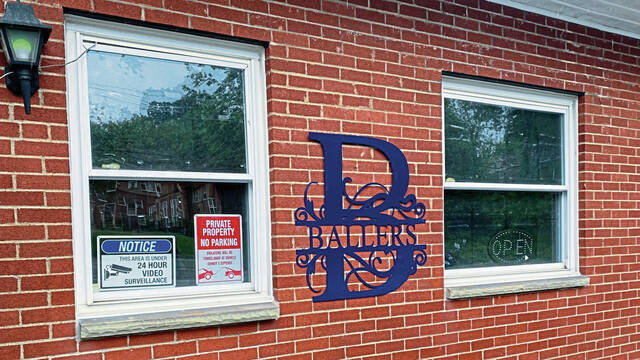It’s not easy to convince a room full of first graders to try broccoli sprouts, but Matt Zuk did just that on a recent Friday morning.
As founding CEO of Terroir Designs, Zuk has partnered with Penn Hills Charter School of Entrepreneurship since 2018, giving monthly lessons to students in grades K-6. After all this time, he is still impressed by the reception to his lesson on indoor growing.
“Eating broccoli sprouts — that was so cool,” Zuk said.
The remaining sprouts will grow into part of the school’s Eagle’s Nest Food Forest. For now, the food forest is a humble patch of grass at the front of campus, with a few fruit trees planted by students in past years.
With a $15,000 grant from the Pennsylvania Department of Agriculture, teachers and school officials hope to transform the space into an outdoor classroom where students can learn how to grow sustainable, healthy food.
The school and Terroir Designs are still planning what will be grown in the food forest, according to Principal Jessica Zuk, but it could include various vegetables, fruit trees and nut trees. Weather permitting, they’ll start work on a trail through the forest-to-be during spring break in April.
Forest foods are more than just eclectic gardens — they’re a type of permaculture, a philosophy for growing food that creates self-sustaining, productive plots of land that mimic natural ecosystems.
The building blocks of food forests are guilds, or communities of plants that grow and support each other by recycling nutrients, enriching soil and conserving water. When several guilds are combined, they become a food forest.
Pennsylvania has set aside $500,000 for projects like these through its Farm to School Grant Program. Recipients can get up to $15,000, as PHCSE did, for projects that “improve access to healthy, local foods and increase agriculture education opportunities for pre-kindergarten through eighth grade.”
Schools must match at least 25% of the total costs and use the state money for agricultural products, supplies, personnel, travel, critical equipment or, to a limited extent, indirect costs. Projects must be completed no later than the end of June 2025.
For PHCSE, the money will go toward soil, seeds and equipment to level and plow the area.
Donna Wallace, the school’s nurse, helped to apply for the grant last year.
“This is the way to demystify healthy food,” Wallace said. “Unhealthy food is cheap. If they have that ownership, they’re going to eat the food that they grow.”
The food forest is just one way that PHCSE has taken advantage of its outdoor space on campus.
Zuk, the principal, said the school also has installed 10 raised garden beds to replace ones that were removed to make room for a second-floor addition.
“We’re so lucky to have the grounds we have,” she said. “We’re trying to use them to educate students.”
There also is an off-campus community garden on Ford Avenue maintained by the school’s Advancing Youth Initiative foundation. Students go over there for the occasional gardening lesson.
Furthermore, the school has lived up to its name by ”trying to infuse the entrepreneurial piece into it,” Jessica Zuk said. Each month, the school brings in entrepreneurs from relevant local start ups, such as The Hood Garden and Worm Return.
As for the food forest, that’ll take time, Matt Zuk said. His hope is that students absorb his lessons without even realizing it, giving them gardening skills for life.
“When all of us are gone, there’s going to be plenty of fruit here from our labor,” Zuk said.











